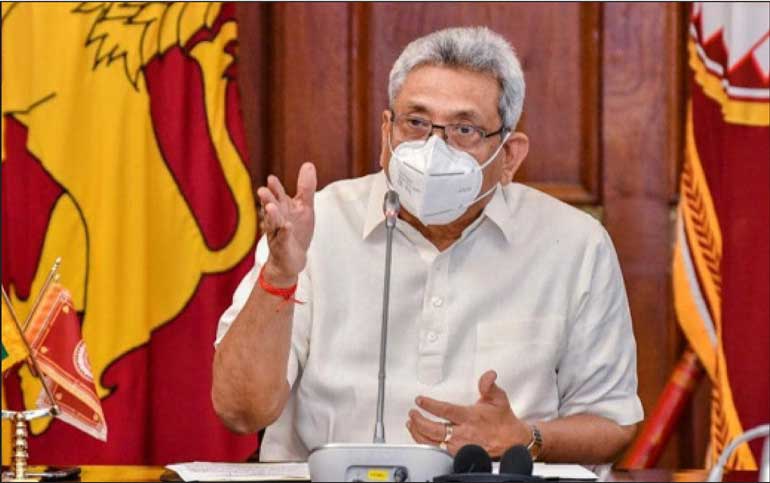Friday Feb 20, 2026
Friday Feb 20, 2026
Monday, 24 May 2021 00:00 - - {{hitsCtrl.values.hits}}

President Gotabaya Rajapaksa
 A collapsing economy, an escalating killer virus, calamitous foreign policy and a querulous coalition are the most conspicuous elements that have stymied Gotabaya Rajapaksa’s (GR) Vistas of Prosperity and Splendour, hoped to be achieved within a virtuous and disciplined society.
A collapsing economy, an escalating killer virus, calamitous foreign policy and a querulous coalition are the most conspicuous elements that have stymied Gotabaya Rajapaksa’s (GR) Vistas of Prosperity and Splendour, hoped to be achieved within a virtuous and disciplined society.
His is an ‘alternate way,’ said his handpicked Governor of Central Bank, Professor Lakshman, and State Minister Nivard Cabraal, without elaborating on how that alternative would lead to GR’s Valhalla.
The reasons for this doubt are everywhere to be seen. Economically, ordinary households and local producers and distributors are continuing to face difficulties, partly because of systemic failures and partly because of impulsive decisions made by GR without an overall and coordinated economic strategy.
The public health disaster, worsened by politically compromised measures based on quasi-expert health advice, is yet to reveal its true magnitude. Internationally, because of the regime’s continued stubbornness in its unwillingness to address the minorities problem, world bodies are exerting enormous pressure to address human right issues.
Above all, because of a series of diplomatic failures the country is being deliberately dragged into the regional geopolitical vortex, which is threatening to mortgage its sovereignty for survival. The passage of the (Chinese) Port City Bill in the Parliament is the latest in this geopolitical gamble.
Regime’s survival
Given this multiplex imbroglio, what is the alternative for the regime to survive politically to complete its current term of office and perhaps even beyond?
When GR, the military man, became the President in November 2019, he inherited a democratic legacy, although that legacy had been progressively debilitated by successive governments since the time the country received its independence from British. However, even in its emaciated form there were some checks and balances against misrule.
An independent Judiciary to safeguard the principle of rule of law, a vibrant parliamentary opposition to audit Government policies and fearlessly expose their shortcomings to a politically-alert electorate, a competitively chosen cadre professional public servants, various statutory bodies administered by an incorruptible and independent-minded personnel, a constitutionally established independent Central Bank to monitor the state and performance of the economy with its bounden duty to provide unbiased advice to the Government, and a critical media to scrutinise the activities of the rulers and administrators and to inform the voting public accordingly.
What GR did since he assumed power was to progressively weaken these agencies and subjugate them under his command through constant interference and orders, and by removing the recalcitrant to be substituted by the pliant. Above all, GR had the foresight to expect a future eventuality of popular discontent and therefore precautionarily fortified himself with military personnel by planting them as heads of various task forces.
For all intents and purposes there is a de facto military regime in Sri Lanka. To add a layer of piety to his otherwise regimental autocracy however, he pretended to seek the advice of the top men from the Sangha.
Cracks appearing
In spite of all this, cracks are beginning to appear in the fortress wall. For example, the judgement of the Supreme Court and few of its not-so-cosmetic recommendations over petitions filed against CPC Commission shows that at least a few men and women in the Judiciary have a patriotic conscience and that they would be prepared to demonstrate it when circumstances demand.
Contrary to wide expectations, the eminent judges have pointed out the dangers inherent in the way that Commission is designed to constitute and scheduled to operate. That the Parliament has ignored their warnings, amended the Bill in a hurry (with support of at least a couple of Muslim turncoats) by accommodating some cosmetic changes and succeeded in passing it, does not obviate the impending calamity. In the ultimate analysis, that bill is a victory to China.
Even before the Court’s verdict, popular agitation against CPC had started and surprisingly even sections of Buddhist clergy had begun to realise that the country needs a change of direction. That noisy protest when Chinese VIPs visited the country the other day was another sign of the crack. Unfortunately, the opposition is so dishevelled and directionless that it lacks the capacity to convert the discontent into mass resistance.
However, what the Opposition is failing to do, the economy and the epidemic would do for them. Professor Lakshman’s announcement that the Central Bank may have to revise and downgrade the economy’s growth expectations is a tacit admission that a gloomy future is awaiting the nation. As it is, the economy is operating not for the benefit of the masses but for the benefit of just 1% of the population to whom Sri Lanka is an earthly paradise. The CPC is destined to add more fortunes in its favour.
The middle class is virtually non-existent and the country has only the have lots and have-nots. Meanwhile, the epidemic is paralysing people’s life through unpredictable lockdowns and isolated areas. Unless some miracle intervenes to cause a dramatic reversal, mass revolt against the regime is not improbable. In this environment GR and MR wouldn’t dare testing their popularity by holding PRC elections. With military support the regime would continue its term of office come what may.
Domestic security
Yet, there is one issue the regime would continue to exploit to its advantage, in times of an existential crisis, and that is the issue of domestic security. GR came to power on that issue and would continue to thrive on the same issue. To him and to his regime, there are still remnants of LTTE lurking in north and east threatening the security of the country. After the Easter Sunday carnage, Islamic fundamentalism and extremism have been added to this threat.
The destruction of Mullivaikkal memorial on 12 May by unknown criminals, which coincidentally occurred soon after the passage of the Private Bill 104, ‘Tamil Genocide Education Week’ in the Ontario Legislature, Canada, was the latest of a number of anti-Tamil mischiefs that had been tolerated by the regime.
Similarly, in the wake of PCoI report, arbitrary arrests and torturous interrogations of Muslim suspects by security forces have the potential to provoke emotional reaction from disgruntled Muslim elements acting as lone wolves. In the meantime, far right groups like BBS, which have been allowed to operate with impunity, in spite of being recommended to be proscribed by PCoI, indicates that the regime sees a useful role for them and similar groups like Sinha Le, Mahason Balakaya, Ravana Balaya and so on, in times of critical need.
The regime could employ their expertise to create chaos so that the military could be called upon to establish order and protect the regime. This is a worrying prognosis, but cannot be dismissed in view of GR’s vanishing vistas.
(The writer is attached to the School of Business & Governance, Murdoch University, Western Australia.)